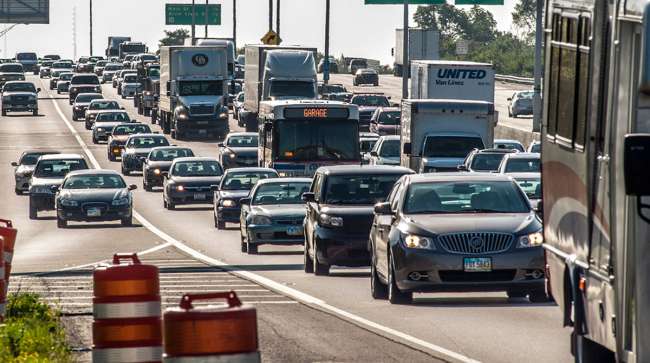Senior Reporter
Rep. DeFazio to Highlight Road Congestion Remedies

[Stay on top of transportation news: Get TTNews in your inbox.]
WASHINGTON — Rep. Peter DeFazio, chairman of the U.S. House transportation committee and author of a comprehensive five-year, $547 billion highway bill, is very aware that being stuck in traffic is bad for business.
That’s why, when his highway policy bill is debated on the floor of the chamber as early as this month, he plans to remind the country the legislation seeks to help everybody — including the commercial transportation sector — spend less time stuck in traffic.
“Companies are losing money because of congestion and delays,” DeFazio (D-Ore.) told Transport Topics during a June 16 one-on-one interview in his Capitol Hill office. “This bill is going to be a major investment in — the largest single investment in — surface transportation infrastructure ever.”
People are pretty tired of congestion. They’re pretty tired of repair costs [because] of potholes. They’re tired of detours.
Rep. Peter DeFazio
Specifically, the bill’s proposals would assist transportation agencies with alleviating concerns linked to freight supply chains, as well as enhancing infrastructure resilience to severe-weather events. Congestion relief and climate change are primary policy drivers proposed in what would be an update of the nation’s surface transportation policies, as well as a pillar of President Joe Biden’s infrastructure agenda.
“People are pretty tired of congestion. They’re pretty tired of repair costs [because] of potholes. They’re tired of detours,” DeFazio said.
To attempt to improve connectivity and minimize congestion, DeFazio’s highway bill would dedicate $343 billion for roads, bridges and safety programs, approximately $100 billion for transit systems and $95 billion for freight and passenger rail programs. There also is about $6 billion for projects specific to congressional districts.
Recent findings from the American Transportation Research Institute determined traffic was a contributing factor in slowing trucks on the roads. Freight bottlenecks lead to an annual 1.2 billion hours of lost productivity for the trucking sector, which is an additional $75 billion to the cost of freight distribution, according to ATRI. Separately, recent studies have found commuters in large cities frequently encounter delays on roadways and transit.
The House highway bill, named the Investing in a New Vision for the Environment and Surface Transportation, or INVEST, in America Act, is at the moment largely backed by Democrats. The five-year, $547 billion reauthorization was approved in committee June 10 by a vote of 38-26.
The #INVESTAct will make sure we rebuild our infrastructure with American workers, American-made materials, and American ingenuity thanks to strong #BuyAmerica provisions and labor protections. Let's rebuild our country and create millions of jobs that cannot be exported. — Committee on Transportation and Infrastructure (@TransportDems) June 14, 2021
An emphasis on themes outside traditional surface transportation policies, as well as programs linked exclusively to climate change, contributed to the lack of support from Republicans.
DeFazio said he is working with his colleagues across the aisle to bridge the gap when debating terms such as “climate change,” as opposed to “severe-weather resilience.”
“The Republicans say they want [severe-weather] resilience: ‘The sea level is rising. Hurricanes are getting worse. We want resilience.’ And I said, ‘OK, well, then can we deal with climate change.’ They say, ‘No, no, no. That has nothing to do with climate change. Climate change is fake. It doesn’t exist,’ ” DeFazio said. “They’re fully willing to work on those things but they’re not willing to talk about what the root cause might be.”
DeFazio added, “I’m doing resilience. They’re supportive of that.”
Additionally, DeFazio affirmed his bill’s focus on trucking policies that would promote safety and workforce development. Provisions in the House bill related to trucking include approval of $2.2 billion in contract authority for fiscal 2023 through 2026 for motor carrier safety grants. DeFazio also noted a proposal that would establish a truck leasing task force meant to examine truck leasing agreements, a matter that has been on his radar.
“I held hearings on this years ago. … So, we’re going to have the secretary of transportation and the secretary of labor set up a truck leasing task force to look into these practices,” he said.
When the highway bill is passed by House lawmakers, DeFazio and fellow House leaders will meet with Senate counterparts to reach a deal on a final highway policy measure. Senators are finalizing their version’s consideration to update a 2015 highway law, which expires in September.
Neither the House nor the Senate highway bills would set a long-term funding mechanism for federal highway programs. Those highway programs are backed primarily by insufficient revenue from federal fuel taxes. Asked about fuel taxes, DeFazio said the matter belongs to the tax-writing Ways and Means committee. That tax policy panel has yet to legislate on highway funding programs.
In his own words, “The ideas I have are not in sync with what the president [Biden] has. So, I believe that we can work with user fees, indexation, bonding, etc. But, that’s off the table, so just forget about it. Right now, it’s up to the Ways and Means committee.”
The bill also would direct the Federal Motor Carrier Safety Administration’s administrator to accelerate the modernization of the agency’s information technology and management systems, and encourage states to participate in a comprehensive information systems management program.
Want more news? Listen to today's daily briefing below or go here for more info:





